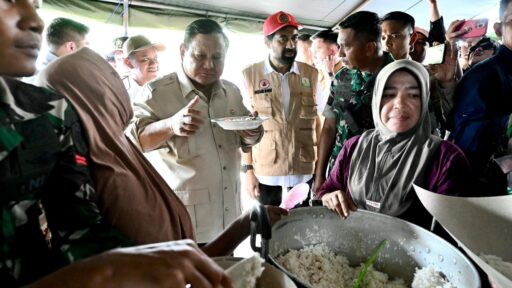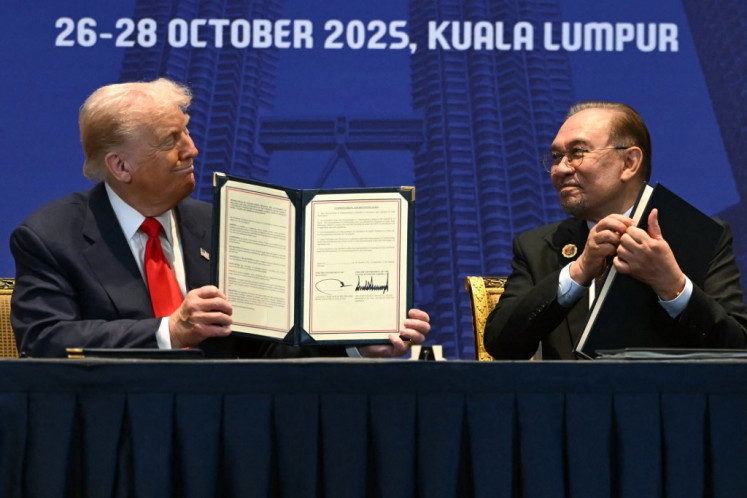Popular Reads
Top Results
Can't find what you're looking for?
View all search resultsPopular Reads
Top Results
Can't find what you're looking for?
View all search resultsJokowi's administration plans reforms to boost tax collection
President Joko âJokowiâ Widodo said Thursday that he would reform the tax collection system in order to boost tax revenues from the increasing number of business organizations in Indonesia and the countryâs growing middle class
Change text size
Gift Premium Articles
to Anyone
P
resident Joko 'Jokowi' Widodo said Thursday that he would reform the tax collection system in order to boost tax revenues from the increasing number of business organizations in Indonesia and the country's growing middle class.
Speaking in the Presidential Palace on Thursday, Jokowi noted that the government had not once met its tax collection targets from 2005 to 2013 and the economy's taxation ratio only increased by 0.1 percent over the last 10 years.
'We have estimated that there is so much potential and opportunity in our tax sector,' he said, adding that by improving the collection system, the government would be able to increase its revenues.
There should be additional efforts made to boost tax revenues, Jokowi said, pointing to the fact that there are only 17 million returns (SPT) received every year by the Finance Ministry's taxation office. The number is quite small compared to Indonesia's total population, which currently stands at around 240 million.
The government has aimed to collect Rp 1.38 quadrillion (US$113.79 billion) through taxes next year in the 2015 State Budget plan. Tax revenues account for 78 percent of the total state revenues of Rp 1.79 quadrillion.
- Government has never met its tax revenue targets since 2005: Jokowi
- RI's tax revenue-to-GDP ratio is 12 percent, among the lowest in ASEAN
Indonesia's taxes-to-gross domestic product (GDP) ratio is 12 percent, among the lowest in the region, compared with 14.5 percent in Singapore, 16.1 percent in Malaysia and 16.5 percent in Thailand, official estimates show.
In his presidential campaign, Jokowi has vowed to boost the taxes-to-GDP ratio to at least 16 percent, planning to replicate his accomplishments on the regional levels, where he succeeded in increasing tax revenues as mayor of Surakarta, Central Java and as governor of Jakarta.
As Surakarta mayor, Jokowi boosted locally generated recurring revenues (PAD) by 12.5 percent on an inflation-adjusted basis, twice Central Java's average of 6.4 percent, according to data from the Central Statistics Agency.
As governor in Jakarta, he increased locally generated revenues from Rp 30.6 trillion in 2012 to Rp 41.5 trillion in 2013.
Philip McNicholas, an economist with BNP Paribas, explained that Jokowi succeeded in boosting Surakarta's tax income by enhancing the local revenue base, as he reduced the city's reliance on central government transfers for funding and allowed scope for more growth-enhancing discretionary spending programs.
'Jokowi has a record of bolstering the tax take,' McNicholas said Thursday via an e-mail interview. 'While considerably more challenging, hopefully Jokowi can, at least partially, repeat this success at the national level.'
Jokowi's mission to boost tax revenues is at risk because of a possible slowdown of economic growth, which may erode corporate earnings and corporate tax payments, analysts have warned.
However, the new government could see a significant boost in tax collection if there's support from other financial institutions, such as the Financial Services Authority (OJK), said Finance Minister Bambang Brodjonegoro.
Allowing the tax office to access the bank accounts of Indonesians is 'the easiest way' to boost tax revenues, as the strategy could make it easier for the government to verify tax payments.
'Currently each official in our tax office is responsible for handling 8,000 taxpayers. Given their workload, the easiest way for our employees to verify tax payments is through [the taxpayers'] bank accounts,' Bambang said in a recent interview with The Jakarta Post.
'It would be difficult for us if the bank accounts remain closed. That's the easiest way [to boost tax
revenues].'










